Pros And Cons Of Getting A Personal Domain Name In 2024
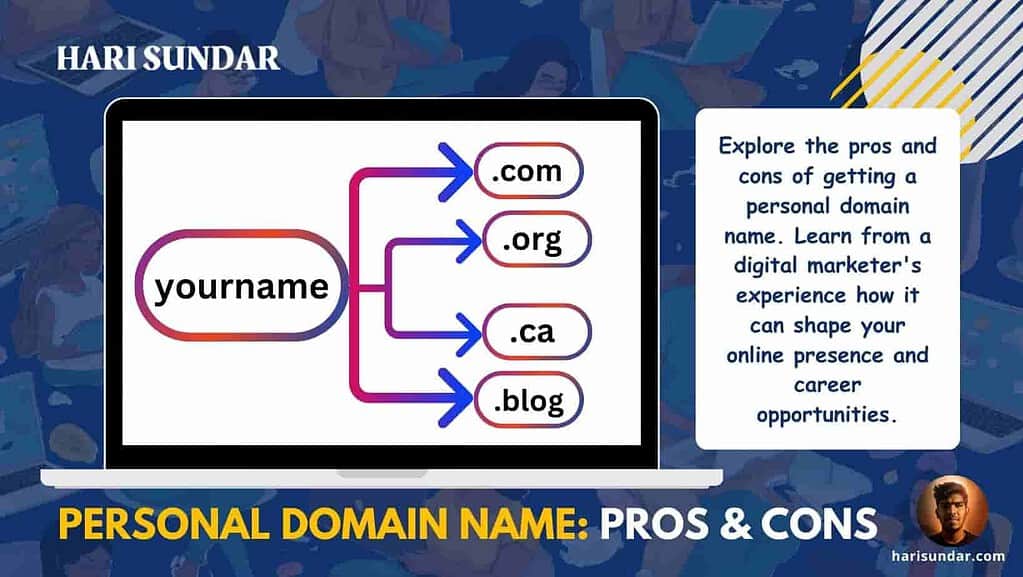
Did you know that 77% of marketers consider personal branding more crucial than company branding? I didn’t when I started my blogging journey in 2019.
Back then, I was just another face in the digital crowd, wondering if I should invest in a domain with my name on it. Fast forward to today, and I’ve seen firsthand how a personal domain can shape your online presence.
Whether you’re an aspiring entrepreneur, a freelance writer, or someone looking to carve out their own space online, weighing the pros and cons of getting a personal domain name is crucial.
As someone who’s navigated the ups and downs of digital marketing, I’m here to share my experiences and insights.
We’ll explore everything from building your brand to potential pitfalls, helping you decide if a personal domain is right for you.
Here’s what we are going to cover about Personal Domain Names – Pros and Cons Unpacked
- 🏠 Discover if a personal domain is your digital home
- 💼 Learn how a personal domain can boost your professional brand
- 🚫 Uncover potential pitfalls before investing.
- 🔄 Explore the flexibility of personal domains for career pivots
- 🛠️ Get practical tips on setting up and maximizing your domain’s potential
If you’re new to this, you might find my guide on choosing a domain name helpful as we dive in. Ready to explore the world of personal domains? Let’s get started!
The Upsides of Owning a Personal Domain Name
Owning a personal domain name is like planting your flag in the digital world. It’s not just about having a cool web address; it’s about creating a space that’s uniquely yours.
In this section, we’ll explore the benefits or the pros of having your own domain and why it’s a smart move for your online presence.
Your personal domain Builds a strong personal brand and it is the cornerstone of your online identity. It’s like your digital business card, but way cooler.
When you choose a domain name that reflects your personal brand, you’re telling the world, “This is me, and I’m here to make my mark.”
For example, using a domain like “yourname.com” instantly makes you more memorable. It’s not just another social media profile lost in the sea of usernames. It’s your piece of internet real estate.
It offers complete control over your online identity. With your own domain, you’re the boss of your online presence.
No more worrying about social media platforms changing their rules or disappearing overnight. You decide what goes on your site, how it looks, and what message you want to send.
Unlike social media, we have full customization options with a blog. Because a blog is the central repository of our digital presence.
It enhances credibility and professionalism. A personal domain screams “I’m serious about what I do.” It shows potential clients, employers, or collaborators that you’re invested in your online presence.
According to a study by Verisign, 65% of consumers believe a company with a branded email is more credible than one using a generic email address.
It provides flexibility for future career changes. Life’s unpredictable, right? Your personal domain can evolve with you. Whether you’re switching careers or choosing a new niche, your domain can adapt.
It enables you to pivot your career multiple times and each time, your domain will be there to showcase your new skills and interests without losing your established online presence.
Personal branding improves search engine visibility because search engines love personal domains. They’re seen as more authoritative and relevant, especially when someone’s searching for you specifically.
This means when potential clients or employers Google your name, your site is more likely to pop up at the top.
For example, when you Google Ali Abdaal, who is a famous productivity coach, his site would appear as the first site because Google knows that he is a personal brand.
A personal domain creates a unique email address. Having an email like “you@yourname.com” is pretty slick.
It’s professional, and memorable, and adds a personal touch to your communications. Plus, it’s way easier to remember than “cooldude123@genericmail.com”.
Implementing these benefits is easier than you might think. Start by registering your domain (there are tons of domain registrars out there), set up a simple website (platforms like WordPress make this a breeze), and voila! You’re on your way to a stronger online presence.
Remember, your personal domain is an investment. It’s not just about having a website; it’s about creating a hub for your online activities, a place where you can showcase your work, share your thoughts, and connect with others in your field.
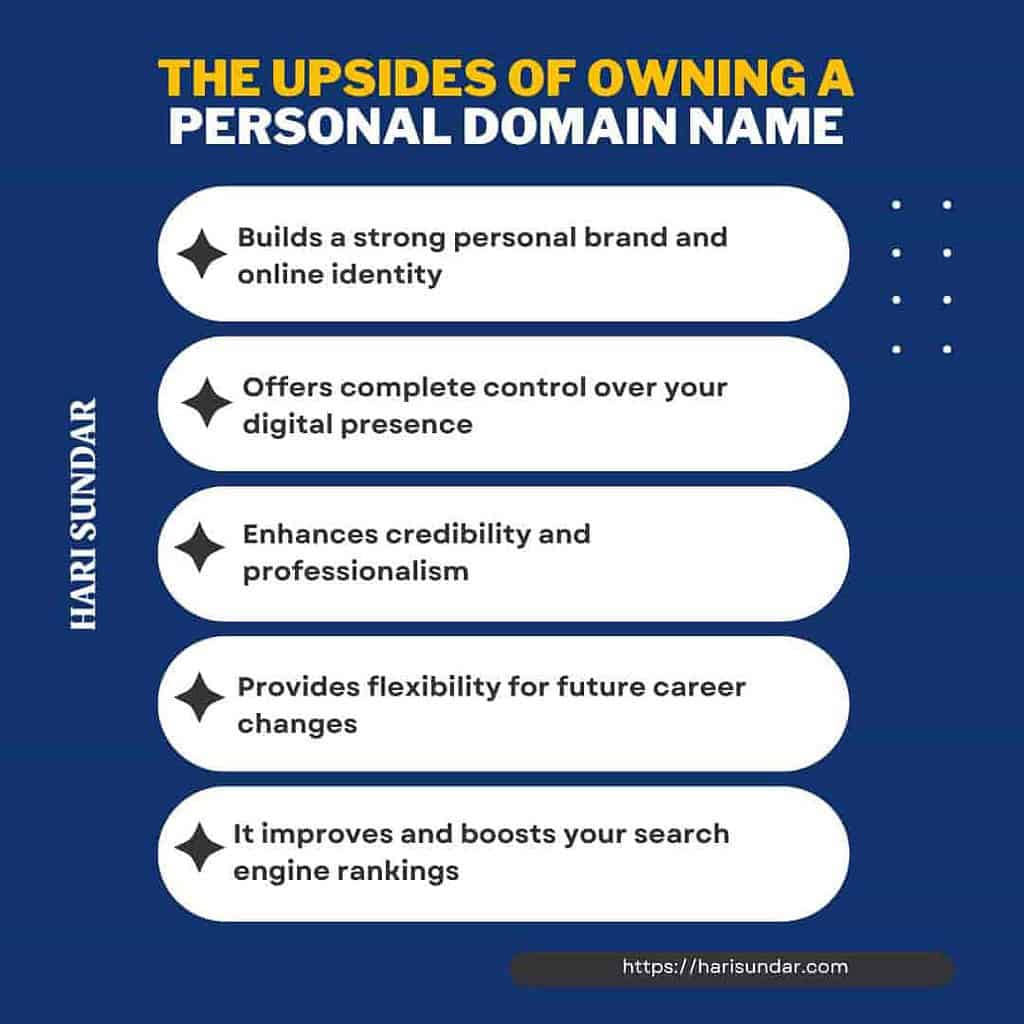
The Downsides of Getting a Personal Domain
Alright, let’s talk about the potential pitfalls you might face when owning a personal domain. It’s not all about looking cool and professional – there are some real challenges you might face.
First off, let’s talk about money, I’m not going to sugarcoat it – owning a domain costs money. I was pumped to get my domain when I started my blogging journey. But friend, those costs can sneak up on you!
You’re looking at yearly renewal fees, hosting costs, and maybe even extras like privacy protection. It’s like having a tiny digital mortgage that never goes away.
And here’s the kicker – if you’re not using that domain, it’s just throwing money out the window.
I faced it, I bought a domain that is still unused, and I renewed it two times. Trust me, it doesn’t feel great seeing those renewal notices pop up.
But, it is also not too bad when you consider it from a business standpoint. Securing multiple domains related to your business can future-proof your business but it adds up the future costs.
Now, let’s talk about time. Setting up a domain isn’t a “set it and forget it” deal. You’ve got to manage renewals, keep your contact info up to date, and deal with any technical hiccups.
For someone who’s not tech-savvy (like I was at first), there will be some learning curve. Even though most hosting companies provide customer support, you need to learn at least the basic setup.
The next is privacy. What Privacy? Here’s something I wish someone had told me early on; your domain registration info is public by default.
Yep, that means your name, address, and contact details are out there for anyone to see.
Anyone can look up your name, address, and phone number using a free WHOIS search tool.
It’s like putting your contact details on a billboard! Sure, you can pay extra for privacy protection, but that’s another cost.
And if you thought your inbox was crowded before, just wait until you set up a custom email with your domain. It’s like putting a “please send me junk mail” sign on your digital doorstep.
Having a personal domain can also put some unexpected pressure on you. It can be a double-edged sword when it comes to your image.
On the one hand, it looks super professional. On the other hand… Well, now people expect you to be professional all the time.
I remember when people started treating me like I had a whole team behind me, not just a guy working from his bedroom table with a few online tools. It was flattering, but also kind of stressful.
It’s when someone grabs a domain similar to yours to profit from your brand. And let me tell you, dealing with domain disputes is about as fun as a root canal.
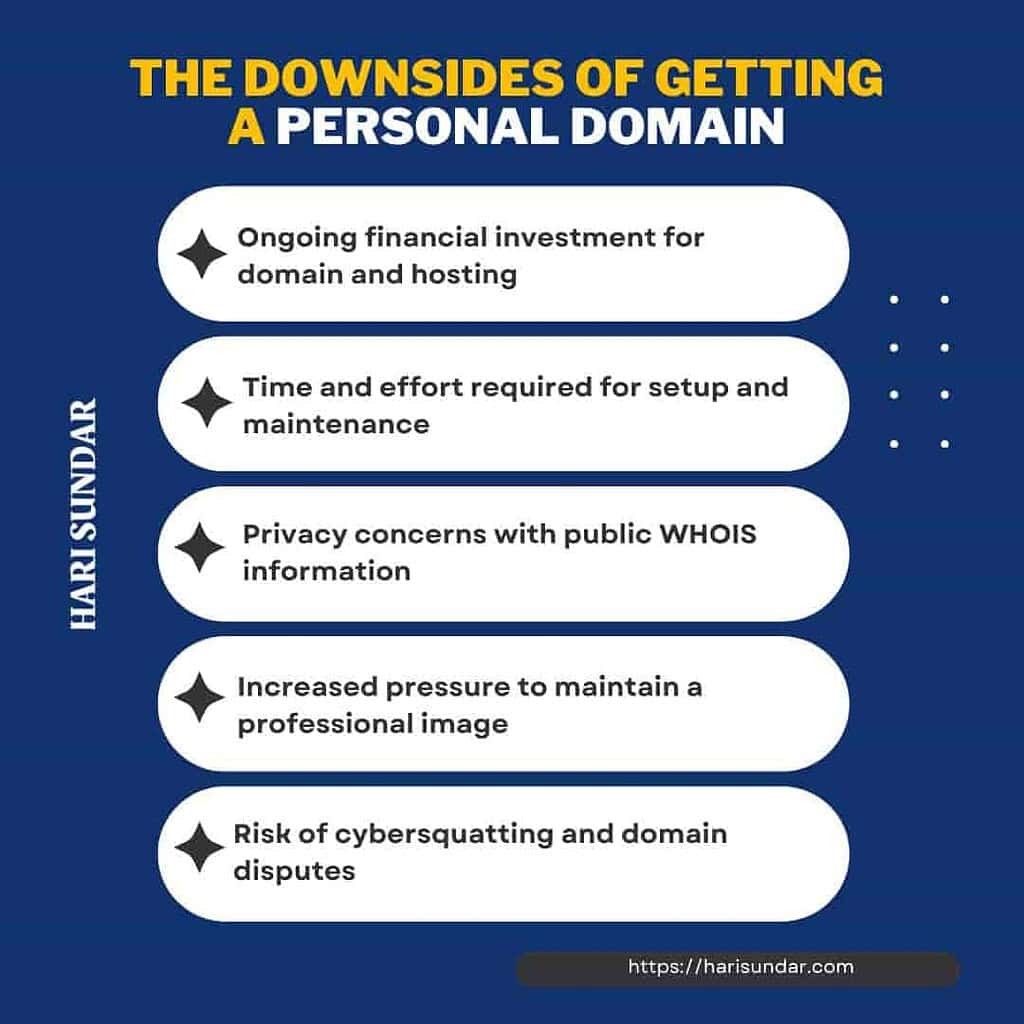
How a Personal Domain Boosted My Online Presence
After dealing with the downsides, you might wonder if getting a personal domain is worth it. Let me share how it transformed my digital journey and why it might be the game-changer you need.
When I first started blogging, I was just another face in the crowd on a free platform.
Some of my posts ranked and some were lost in a sea of competition. But everything changed when I made the leap to WordPress and snagged my own domain.
Having a personal domain isn’t just about looking professional. It’s about taking control of your digital identity.
When I switched from a generic domain to “harisundar.com”, it wasn’t just a new web address. It was like planting my name in the online world and saying, “This is me. This is my space.”
But it wasn’t all smooth sailing. Setting up WordPress was a challenge at first. I spent hours tweaking themes and figuring out plugins.
There were moments when I wondered if it was worth the hassle. But you know what? Those struggles taught me valuable skills that have paid off big time.
Now, you might be thinking, “But what about the costs and privacy issues we just talked about?” Yeah, they’re real concerns. But here’s my take: the benefits far outweigh the drawbacks.
Having a personal domain gives you freedom. If one topic doesn’t work out, you can pivot without starting from scratch.
Look at big names like Tony Robbins or Ali Abdaal – their personal brands allow them to cover a wide range of topics under one umbrella, by using their names.
Plus, there’s something powerful about seeing your name and face on your website. It’s motivating. Who wants to quit when their image is right there on the homepage?
Because most bloggers don’t fail, they quit before they see the results. So, when your blog is attached to your identity it pushes you to keep creating, keep improving.
And let’s talk about longevity. Social media platforms come and go, but your domain? That’s yours as long as you want it. It’s your digital home on the internet.
Sure, selling a personal brand can be trickier than a niche site. But it’s not impossible – just look at Brian Dean selling Backlinko to Semrush. The key is building something valuable, regardless of the name on the masthead.
Look, owning a personal domain isn’t all bad. It’s got its perks, for sure. But it’s important to go in with your eyes open. Weigh the costs, both in time and money, against the benefits.
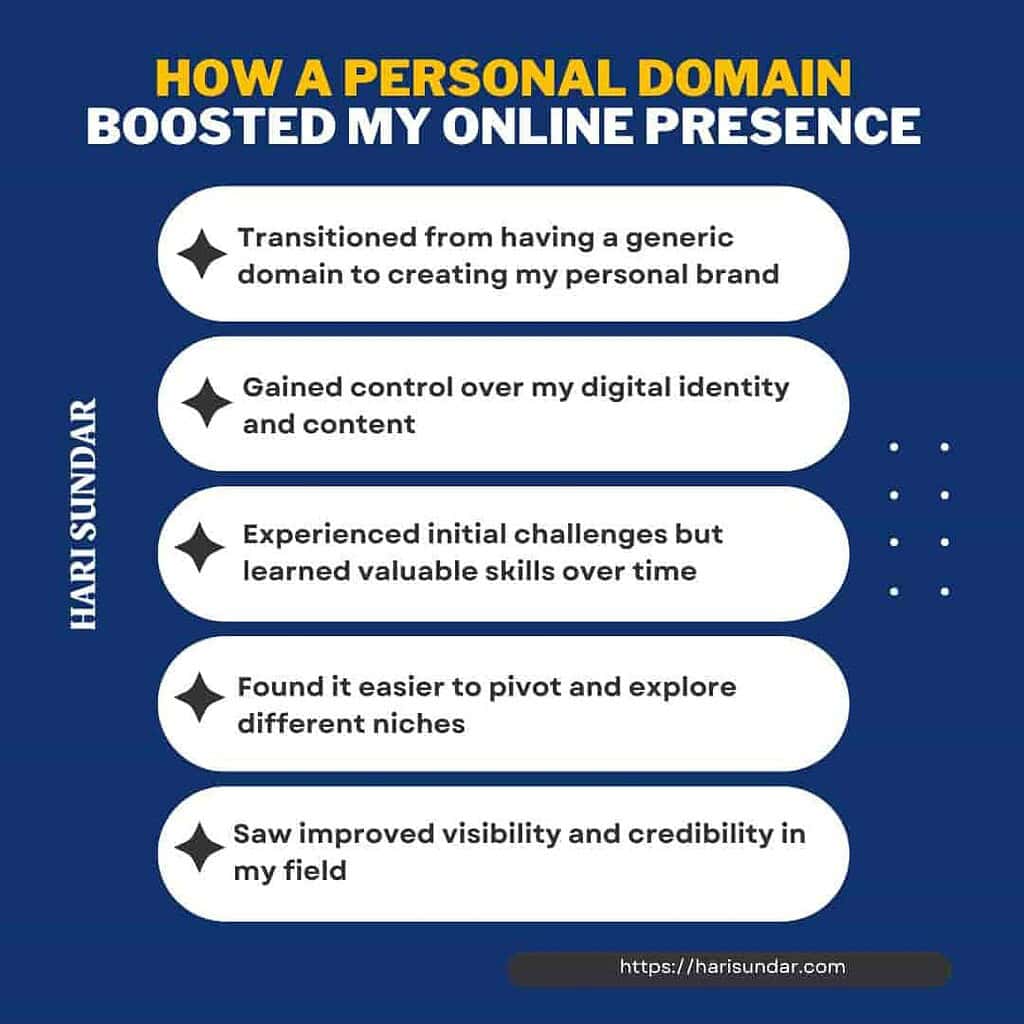
Choosing Between a Personal Name and a Brand Name Domain
Now that you’ve seen the power of a personal domain, let’s tackle a big question: should you go with your name or a catchy brand name? It’s a choice that can shape your entire online identity.
When I was starting out, this decision kept me up at night. I weighed the pros and cons, looking at successful bloggers and their strategies.
In the end, I went with my name, and here’s why:
Personal names build trust faster. People connect with other people, not faceless brands.
Think about it – when you see a name like “Neil Patel” or “Marie Forleo,” you instantly think of a real person sharing their expertise.
But brand names have their place too. They’re great if you’re planning to build a business that might outgrow you someday.
“Moz” and “Backlinko” are perfect examples – they started as personal blogs but evolved into major industry resources.
Here’s a quick way to decide:
- Consider your long-term goals. Are you building a personal brand or a scalable business?
- Think about your niche. Some topics lend themselves better to personal names, others to brand names.
- Check domain availability. Sometimes, this decision is made for you based on what’s available.
In my case, using my name gave me flexibility. I can pivot to new topics without losing my audience. It’s like having a digital business card that evolves with me.
But here’s the cool part – you can blend personal branding with a niche focus. Take “Smart Passive Income” by Pat Flynn. It’s a brand name, but Pat’s personality is front and center.
So, if you’re on the fence about getting a personal domain, here’s my advice: go for it. It’s an investment in yourself, in your future. It’s a step towards building a lasting online presence that can grow and evolve with you.
Building your personal brand even helps you acquire or build companies. Here’s a look at personal brands expanding into company acquisitions:
Neil Patel’s journey is a perfect example of his brand power. He started as a digital marketer and now owns several companies. He acquired Ubersuggest, a popular SEO tool, and transformed it.
Pat Flynn, bought SPI Pro and Flynndustries LLC. These moves expanded his reach beyond just blogging.
Gary Vaynerchuk built VaynerMedia from his personal brand and then acquired PureWow, a women’s lifestyle site.
These examples show how a strong personal brand can fuel business growth and acquisitions. It’s all about leveraging your reputation to explore new opportunities.
Remember, your domain is just the start. What matters most is the value you provide.
Whether it’s yourname.com or catchybrand.com, focus on creating content that helps your audience. That’s what really builds your digital presence and online authority.
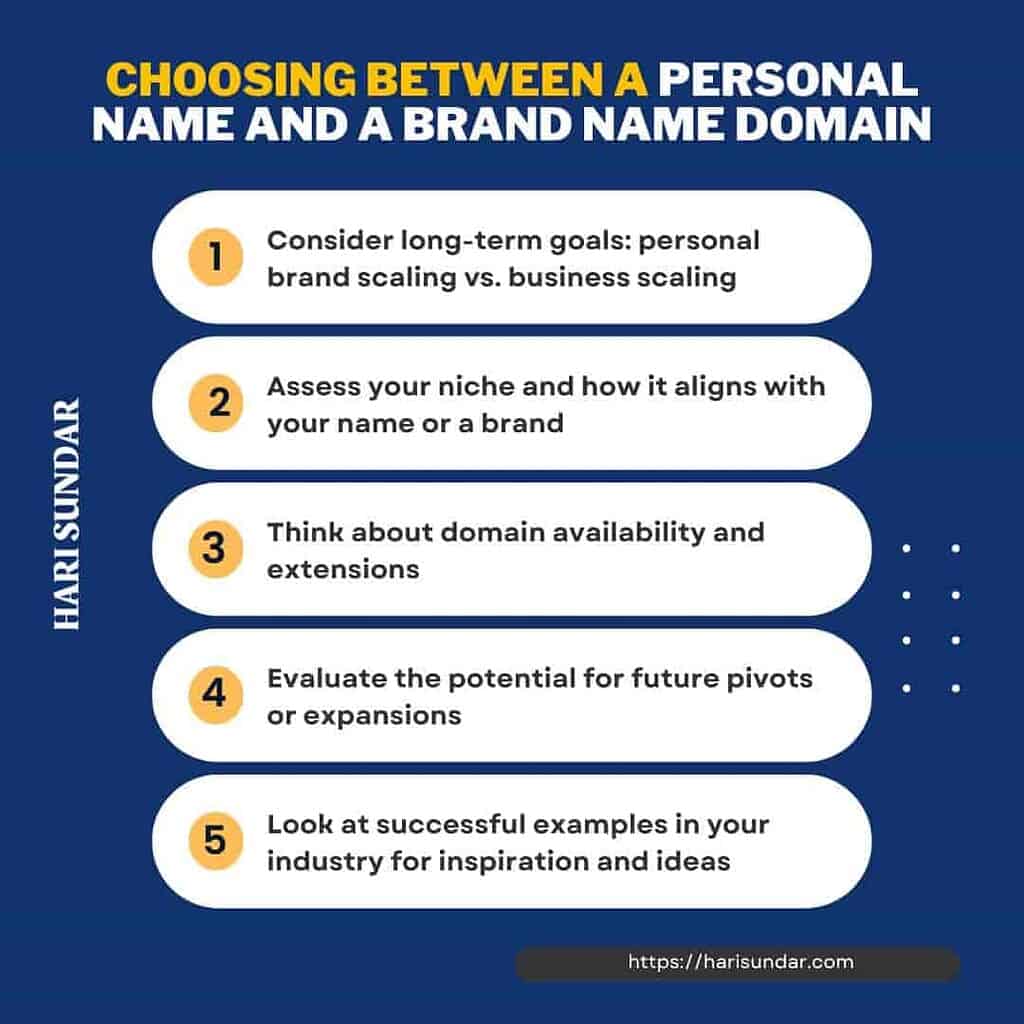
Setting Up Your Personal Domain
Let’s walk through setting up your domain, from choosing a registrar to keeping it secure.
Selecting a Domain Registrar: When I started, I felt overwhelmed by options. Focus on user-friendliness and good support. Don’t just go for the cheapest; think about long-term value.
Tips for Choosing the Right Domain Extension: Your domain extension matters. While .com is common, you can choose between various domain extensions that suit your brand identity.
I picked .com for its familiarity. If you’re struggling to pick the perfect domain, check out my tips on choosing a domain name that reflects your brand.
Connecting your Domain to a Website or Blog Platform: This can be tricky, but don’t worry.
For WordPress, many hosts offer one-click installs. Other platforms need DNS setting changes. It sounds complex, but registrars usually provide guides.
Essential Security Measures to Protect Your Domain: Security is crucial. Start with domain privacy protection to keep your info off public databases. I got tons of spam emails before doing this.
Also, set up two-factor authentication for your registrar account. It’s an extra step that can save you from hacking headaches.
Maximizing the Benefits of Your Domain
Now that you’ve set up your personal domain, it’s time to make it work for you. Let’s explore how to leverage your domain for branding, networking, and showcasing your skills.
Strategies for consistent branding across platforms are crucial in today’s fragmented online space.
Start by using your domain name as your handle on social media platforms whenever possible. This consistency helps people find and remember you easily.
Create a simple logo or visual style that you can use on your website and social media profiles. This visual consistency strengthens your brand.
Tools like Canva make it easy to create professional-looking graphics, even if you’re not a designer.
Your domain is a powerful tool for networking and career opportunities. Use it to create a professional email address (e.g., you@yourdomain.com).
This looks much more professional than a generic Gmail address and reinforces your brand with every email you send.
Include your domain on your business cards and in your email signature. When networking at events or conferences, sharing your website is a great way to stand out. It gives people a place to learn more about you and your work.
Leverage your domain to showcase your portfolio or skills. Your website is the perfect place to display your best work, whether that’s writing samples, design projects, or coding achievements.
Unlike third-party portfolio sites, your domain gives you complete control over how your work is presented.
If you’re just starting and wondering what to write about, exploring beginner blog ideas can help you find your voice. As you grow, you might want to choose a blog niche to establish yourself as an expert in a specific area.
Consider creating a “Work With Me” or “Services” page on your site. This makes it easy for potential clients or employers to see your services and get in touch.
Don’t forget to optimize your domain for SEO. Use relevant keywords in your content, meta descriptions, and page titles. This helps people find you when they’re searching for someone with your skills or expertise.
Lastly, use analytics tools to track how people are interacting with your site. This data can help you refine your content strategy and improve your site’s performance over time.
By consistently leveraging it across your professional activities, you’re investing in your personal brand and opening doors to new opportunities.
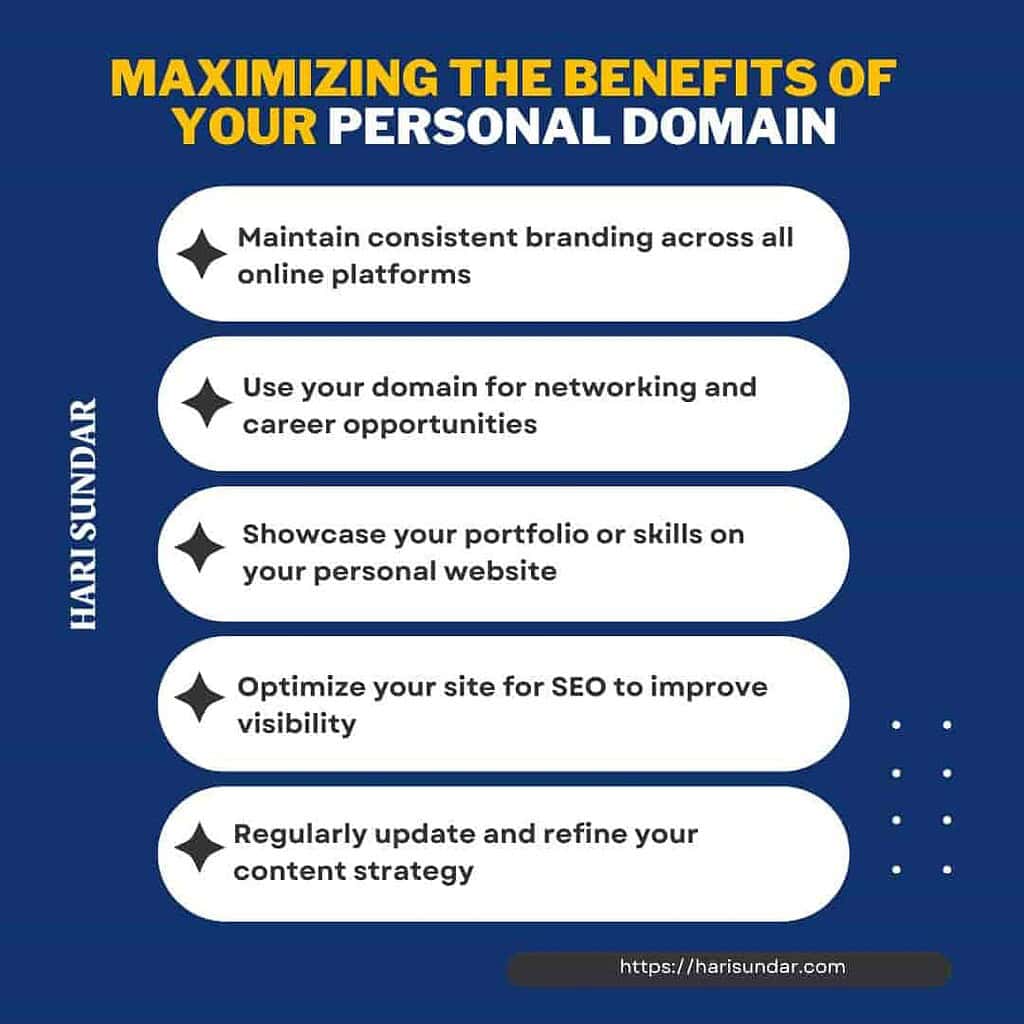
Conclusion
We’ve covered a lot of ground, from the benefits of personal branding to the challenges of managing your domain.
As someone who’s been through this journey, I can say that a personal domain can be a powerful tool – if used wisely.
Remember, there’s no one-size-fits-all answer. Your decision should align with your goals, budget, and comfort level with online visibility.
Whether you choose a personal domain or not, what matters most is the value you provide and the connections you build.
If you’re feeling ready to take the plunge, start by brainstorming domain names that reflect your brand.
Consider your long-term goals and how your online presence might evolve.
On the fence? That’s okay too. Take your time, weigh your options, and choose the path that feels right for you.
Sure, it comes with its challenges, but in my experience, the pros often outweigh the cons.
If you’re feeling inspired to start your online journey, why not take the next step? Check out my guide on starting a blog – it’s packed with everything I wish I’d known when I first started.
And if you’re wondering how to turn your blog into a money-making machine, don’t miss my post on becoming a successful blogger.
So, what do you think? Are you ready to claim your corner of the digital world with a personal domain name?
Whatever you decide, remember that your online presence is a journey, not a destination. Keep learning, growing, and sharing your unique voice with the world.
FAQs: Pros And Cons Of Getting A Personal Domain Name
Is a personal domain worth the cost?
It depends on your goals. If you’re serious about building a personal brand or online presence, the investment can pay off. Just weigh the annual costs against potential benefits like improved credibility and control over your digital identity.
Can I use a personal domain for multiple projects?
Absolutely! That’s one of the best perks. You can use subdomains or different pages for various projects.
How does a personal domain affect SEO?
Generally, it can boost your SEO. Search engines often view personal domains as more credible. Plus, you have full control over on-page SEO elements, helping you rank for relevant keywords.
Is it hard to set up a personal domain?
Not really. Most domain registrars offer user-friendly interfaces. The trickiest part might be connecting it to your website, but there are plenty of guides available. It’s doable, even for tech newbies.
Can I sell a personal domain later?
Yes, you can. Look at Brian Dean selling Backlinko. While it might be trickier than selling a brand-name domain, it’s possible if you’ve built significant value and authority around it.
How do I protect my privacy with a personal domain?
Use domain privacy protection. It masks your personal info in the public WHOIS database. Most registrars offer this service for a small fee. It’s worth it to avoid spam and protect your privacy.
Should I choose a .com or another extension for my personal domain?
.com is still king for recognition, but don’t rule out alternatives. Choose an extension that fits your brand and is easy to remember.






